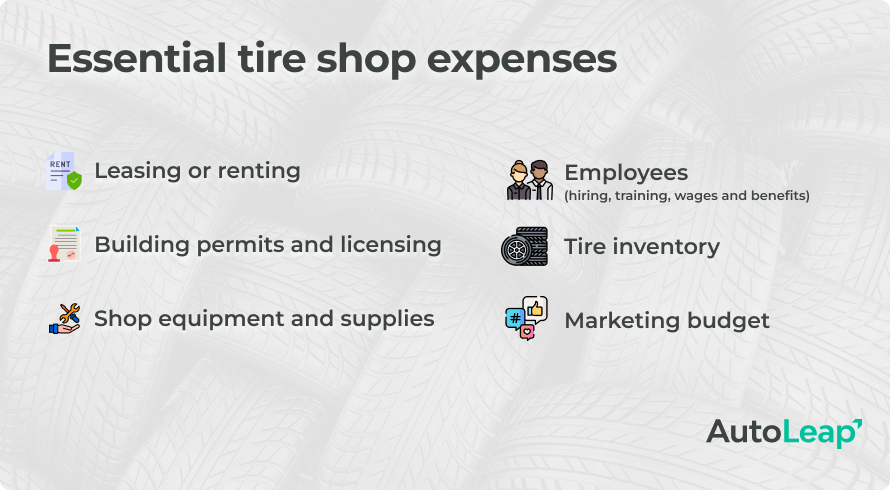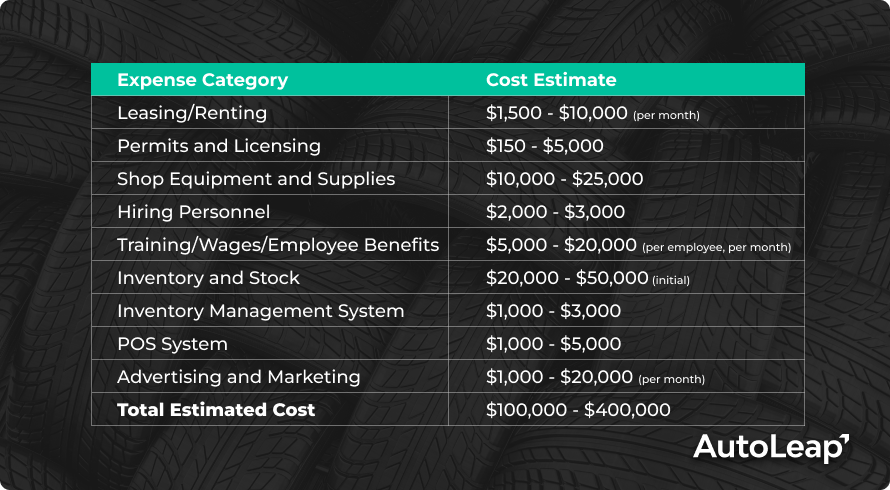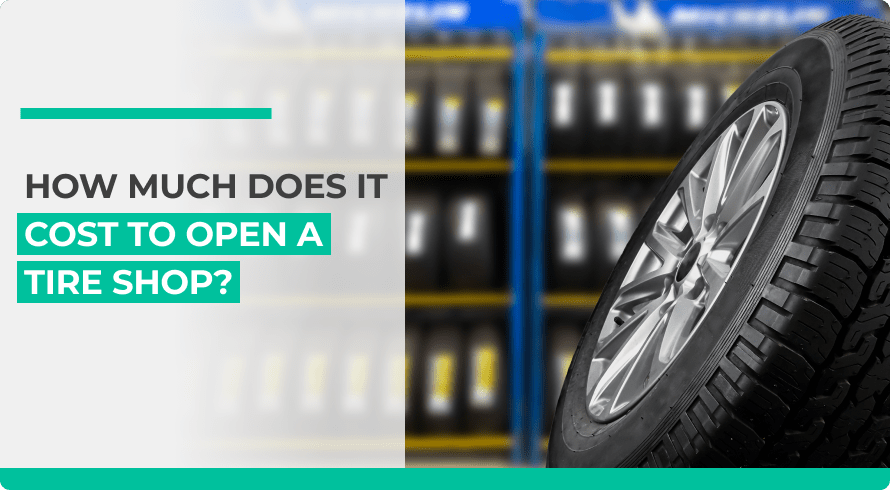Do you want to open a tire shop? And you are wondering how much does it cost to start a tire business? Or are tire shops profitable? Well, we got you! It’s a potentially profitable business opportunity. After all, cars will always need tires, making it a relatively recession-proof industry.
Starting a tire business comes with a significant financial investment like any other venture. We’re here to break down all the costs of opening a tire shop, from leasing a location to stocking inventory, investing in equipment, and marketing your business.
Let’s kick things off with a review of key expenses.
Schedule a free demo today!

Boost your shop sales

Simplify shop management

Empower your technicians
Key costs to open a tire shop

Leasing or renting
The first and most significant expense when opening a tire shop is securing your location. The cost of leasing or renting a shop can vary widely depending on the location, size, and condition of the property.
If you are wondering about how to start a tire shop or opening a tire shop costs then here are a few things you can consider:
1. Location
The location of your tire shop is crucial. High-traffic areas near highways, major roads, and commercial centers may cost more, but they can bring in more customers. Be prepared to pay a premium for these in demand locations.
2. Shop size
The size of your shop should accommodate your inventory, service bays, and a waiting area for customers. Keep in mind: the larger the space, the higher the rent.
3. Condition of the property
If you choose a location that needs renovations or repairs, you’ll need to budget for these expenses on top of the lease or rent. These costs can add up quickly.
Conduct thorough research to find a location that strikes the right balance between visibility, affordability, and suitability for your tire shop.
It all depends on what you want to prioritize when selecting the location of your property. Leasing and renting often fall under the fixed costs that your business has to endure. They don’t change every month.
Decision point: leasing vs purchasing
As a tire shop owner, you also need to figure out if you want to lease property or purchase it.
Leasing is often a good option if you don’t want a long-term investment. Plus it allows you flexibility in case you want to move.
The other option is to purchase property. Those initial costs will be far more expensive. But, there are long-term benefits. For instance, your property will appreciate. And depending on your goals, you can decide whether you want to sell it down the line.
Permits and licensing
To legally operate a tire shop, you’ll need the necessary permits and licenses. Your business has to comply with local, state, and federal regulations.
The specific requirements and regulations may vary by location, but they often include the following:
- Business license
You’ll need a general business license to operate any commercial enterprise, including a tire shop. - Environmental permits
Tire shops often generate waste materials such as used tires. You may need permits to handle and dispose of these materials properly. - Zoning and land use permits
Ensure that you have proper zoning approval for your tire shop location. Do your research on local zoning regulations, verify your property’s zoning status, and apply for a building permit.
Apart from the three licenses and permits mentioned above, your shop may need to meet certain safety standards. This is to protect both employees and customers. For this, your tire shop will have to go through fire and safety inspections.
The cost of permits and licensing for a tire shop can range from a few hundred to a few thousand dollars. It all depends on your location and the state requirements. This is also a fixed cost that your business will have to incur. It’s either a one-time expense or an annual expense.
Shop equipment and supplies
Equipping your tire shop with the necessary equipment and supplies is a significant upfront expense. These costs can vary widely based on the equipment you want to add.
Here’s a list of essential equipment for your tire shop and their approximate costs:
- Tire changer: A quality tire changer can cost around $1,000 to above $2,000, depending on the brand and its features.
- Wheel balancer: Wheel balancers typically range from $2,500 to $5,000.
- Air compressor: Expect to spend anywhere between $50 to $500 for a suitable air compressor.
- Lifts and hoists: Car lifts and hoists can range from $1,500 to $3,000, depending on the type and its capacity.
- Hand tools: Tools such as torque wrenches, impact wrenches, and other automotive tools can collectively cost several thousand dollars.
- Tire repair tools: Tire repair kits, patches, and sealants can respectively cost a few hundred dollars.
- Shop supplies: This includes tire balancing weights, valve stems, and other consumables, which could cost you a few hundred dollars up to a thousand dollars.
- Point of sale system: Investing in a tire shop point of sale software can cost you between $1,000 and $5,000, depending on the system’s complexity and features. A POS system will help you process your customer payments for tire shop services. With advanced software, you can track payments and streamline your accounting experience.
- Alignment equipment: Some tire shops offer wheel alignment service, which will require alignment equipment. This can cost you anywhere from $1,500 to $4,000.
- Diagnostic equipment: Another must-have at your tire shop is a scanner that costs between $1,000 and $1,500. The price tag will all depend on the features you opt for.
Investing in high-quality equipment is essential to ensure efficient and reliable tire services. But it also means a higher initial cost. However, after the initial investment, it becomes a variable cost for your business.
Hiring or training personnel
To operate a successful tire shop, you’ll need a skilled and knowledgeable team. The cost of hiring or training personnel includes wages, training, and benefits.
Before we dissect these costs, we have the actual cost of hiring. This can range around $2,000 – $3,000. That figure includes the cost of advertising for open positions, the interview process, and new hire training.
After hiring comes the other monthly costs. Those include:
- Wages: Salaries for mechanics and tire technicians can vary widely by location and experience. Plan to budget for competitive wages to attract and retain skilled employees.
- Training: If you hire inexperienced staff, you may need to invest in training programs or send them to automotive schools, which can cost a few thousand dollars per employee. Even if you have experienced staff, they will need regular training and development to stay current with industry standards.
- Employee benefits: Provide comprehensive benefits like health insurance, paid time off, and retirement plans to attract and retain quality employees.
Personnel will vary based on the size and scope of your tire shop. But it’s a significant ongoing expense.
Equip your team with modern tools like auto shop scheduling software to ensure seamless communication and task assignments. Explore AutoLeap for cutting-edge solutions tailored to tire shops.
Tire inventory
One of the most critical aspects of running a tire shop is having a wide selection of tires for different vehicles. Here are the expenses related to inventory:
- Initial investment: You will need to get some initial inventory items for your brand new tire shop. The cost of stocking your shop with tires for various makes and models can start at $20,000 to higher than $50,000. This depends on the size of your inventory and the quality brands you will carry.
- Ongoing inventory costs: Apart from the initial inventory you stock up on, you will replenish your tire inventory regularly to meet customer demand. This ongoing expense can vary widely based on the volume of business.
- Storage and display: You’ll need racks, shelves, and storage space for your tire inventory. These costs can add up depending on your shop’s size and layout.
Tire brands
Carrying popular and reputable tire brands can increase your initial inventory costs. But on the flip side, it can also help you attract more customers.
Inventory management
It’s crucial to maintain a well-stocked inventory to meet customer demand. You’ll need to budget for ongoing inventory management and efficient restocking processes.
Advertising and marketing
You’ll need to invest in advertising and marketing to attract customers and build a brand presence.
Here are some essential expenses in this category:
- Website launch: Building a professional website can cost anywhere from a few hundred to a few thousand dollars, depending on the complexity. You also need to consider ongoing website maintenance and digital marketing expenses.You may want to hire a professional web designer to help you make the best website. You will also need a reliable content writer who can help with website content.
- Local advertising: Print ads, local radio, and TV advertising can cost anywhere from a few hundred to several thousand dollars every month. But all this depends on how much you want to advertise.If you want to do flyers, you are looking at an additional cost between $1,000 – $3,500. Again, factoring in the number of flyers you want every month, this will be a variable cost.
- Digital marketing: This includes pay-per-click advertising, social media advertising, and search engine optimization. Costs can vary widely based on the platforms and strategies you employ. But an easy starting cost would run between $300 – $500.When you’re starting out, you might want to focus more on SEO for your tire shop. Instead of putting money into online advertising right away, you can prioritize organic searches. Add to that if you want any email marketing tools or social media management tools.
- Signage: Exterior and interior signage for your shop can range from a few hundred to a few thousand dollars. This is a one-time cost for your tire shop. Company logos, window decals, and any banner/lighted business signs on the shop can cost you between $2,000 – $5,000.
- Promotions and seasonal offers: Offering discounts, promotions, and loyalty programs can attract and retain customers, but they come with associated costs.If you want to start offering discounts as soon as you launch to attract new business, that’s also fine. You can even look at seasonal discounts and promotions around Christmas and New Years.
The cost of advertising and marketing is an ongoing expense that can evolve as your business grows and you refine your strategies. It depends on how much you want to spend across different marketing channels to increase your shop’s visibility. Ultimately, it’s a variable cost that can differ depending on your targeted focus and the time of year.
Miscellaneous costs
Miscellaneous costs can include everything from a cash register to security cameras, stationery, printers, and even furniture for your tire shop’s waiting area. These could cost you anywhere between $5,000 – $10,000 depending on what you invest in.
Additionally, you may want to hire a business consultant to draw up a business plan. That can cost you anywhere from $2,000 up to $5,000. Again, this depends on how long you need their services.
Complete list of tire shop expenses
Here’s a consolidated list of the estimated costs for opening a tire shop:

The total estimated cost above only takes into account one employee. As you add more employees, that cost will go up.
Cost to open a tire shop by state
The costs to open a tire shop can vary significantly depending on the state you choose to operate in. Some primary factors contributing to this variation include the following:
- Location: High-traffic urban areas often have higher leasing costs, while rural areas may have more affordable rent.
- Regulations: Different states have varying regulations, permit fees, and licensing requirements. The different requirements can all impact your initial cost.
- Competition: The level of competition in the tire industry varies by region, affecting pricing and marketing costs.
- Taxes: State tax rates can influence your operating costs and overall profitability.
It’s crucial to conduct a thorough cost analysis based on the specific state and location where you plan to establish your tire shop.
These estimates provide a general overview. The actual costs can vary based on several factors. Every factor matters, from the size and scale of your operation to local market conditions and your business strategy.
Careful planning and financial analysis will determine whether you have a successful launch of your tire shop, regardless of where you choose to open it.
Closing thoughts
So here is your guide to how much does it cost to start a tire shop. Starting a tire shop is a significant financial undertaking. But with thorough planning and a sound business strategy, your tire shop can be a profitable and rewarding venture.
Leverage these insights to create a detailed business plan and secure adequate financing to ensure your tire shop’s success. Good luck!
Frequently Asked Questions
Getting more business at a tire shop depends on how you execute marketing, provide high-quality customer service, and keep up with the latest industry trends.








